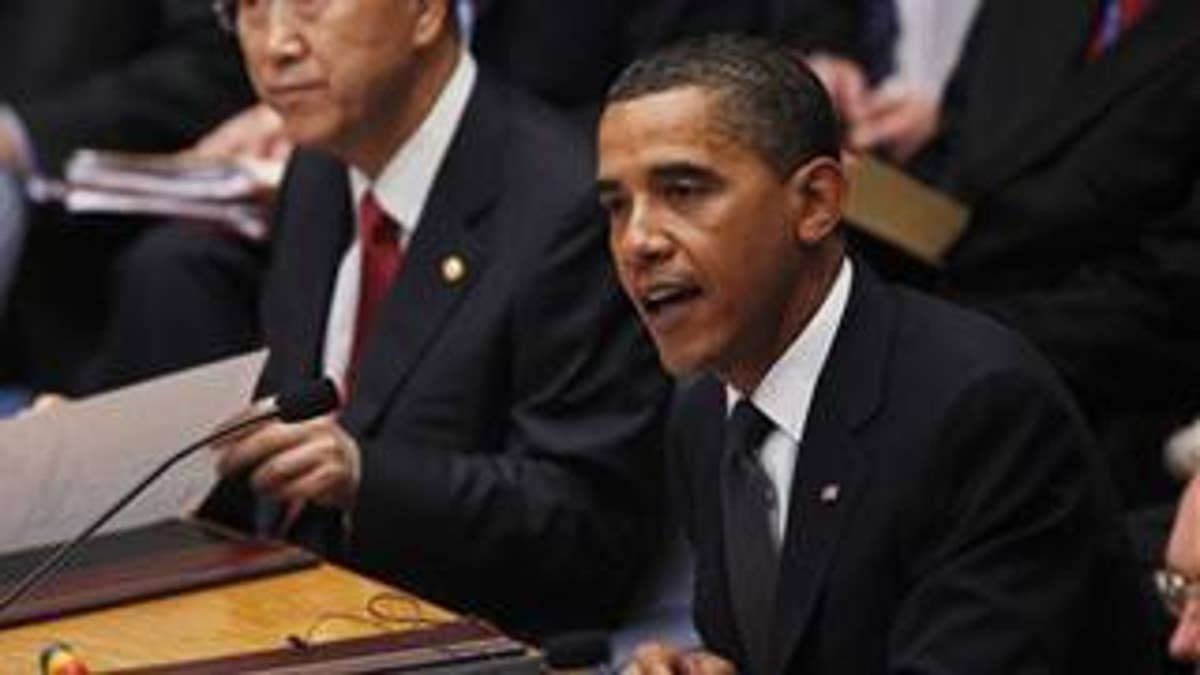
Without singling out Iran or North Korea, the U.N. Security Council on Thursday unanimously approved a U.S.-sponsored resolution aimed at ridding the world of nuclear weapons.
The resolution calls for stepped up efforts to prevent the spread of nuclear weapons, promote disarmament and "reduce the risk of nuclear terrorism." While it does not mention any country by name it reaffirms previous Security Council resolutions that imposed sanctions on Iran and North Korea for their nuclear activities. It does not call for any new sanctions.
President Obama presided over the historic session a day after scolding Iran and North Korea for pursuing nuclear arms, calling on world leaders at the summit to end the spread of nuclear power -- the first time a U.S. president has presided over a Security Council summit.
"We now face proliferation of a scope and complexity that demands new strategies and new approaches," Obama said to a host of world leaders, including Russian President Dmitry Medvedev and Libyan Leader Muommar al-Qaddafi.
"The historic resolution we just adopted enshrines our shared commitment to a goal of a world without nuclear weapons," Obama said. "And it brings Security Council agreement on a broad framework for action to reduce nuclear dangers as we work toward that goal."
Obama said the summit was "not about singling out individual nations," but was aimed at standing up for those nations that agree to the peaceful pursuit of nuclear energy.
"International law is not an empty promise, and treaties must be enforced," he said.
But Obama, British Prime Minister Gordon Brown and French President Nicolas Sarkozy all identified North Korea, which has tested nuclear weapons, and Iran, suspected of harboring weapon plans, as obstacles to a safer world.
Sarkozy sharply criticized both countries for ignoring Security Council resolutions calling on them to cease such activities.
"We may all be threatened one day by a neighbor, by a neighbor endowing itself" with nuclear weapons, he said.
"What I believe is that if we have the courage to affirm and impose sanctions on those who violate resolutions of the Security Council we will be lending credibility to our commitment to a world with fewer nuclear weapons and ultimately with no nuclear weapons," Sarkozy said.
The British leader called on the council to consider "far tougher sanctions" against Iran.
On Wednesday, the Security Council stepped up the pressure on Iran to abandon its nuclear ambitions.
"We expect a serious response from Iran and will decide ... as a result of the meeting on our next steps," British Foreign Secretary David Miliband said, reading a statement agreed upon by the foreign ministers, including U.S. Secretary of State Hillary Clinton.
The powers are to hold talks on Oct. 1 in Geneva over Iran's suspected plans to obtain nuclear weapons. Tehran maintains it will not negotiate uranium enrichment and that its nuclear ambitions are for peaceful, civilian use. But the leaders at the U.N. remain unconvinced.
"Iran's nuclear program remains a matter of serious concern to the international community," Miliband said.
Clinton, who spoke to reporters following the meeting, echoed the group's written statement, and warned Iran should come to the Oct. 1 meeting "ready to engage in substantive discussions." The next step, she said, "depends on Iran's response."
While Clinton wouldn't detail what a next step could look like, she stressed there would be consequences if Iran doesn't show progress.
"We want to see a serious effort by Iran to discuss the nuclear issue," Clinton said, and added Iran must realize it is "at a turning point" and invite international investigators to see and verify its total nuclear program.
The Associated Press contributed to this report.




